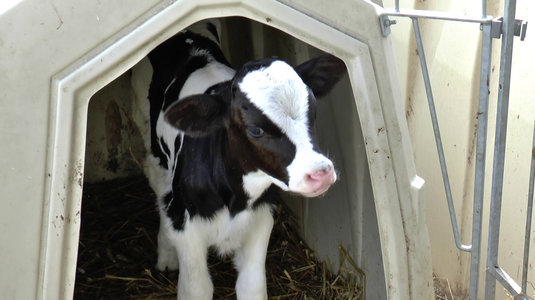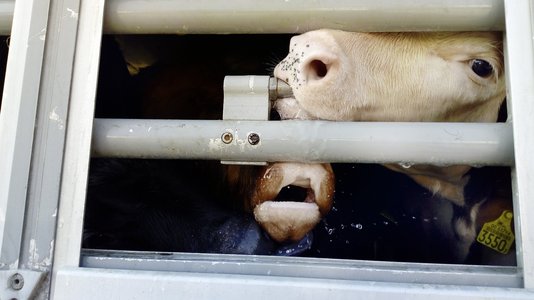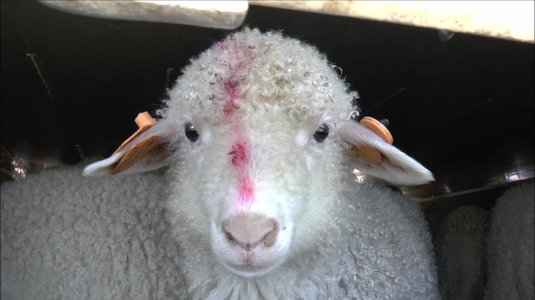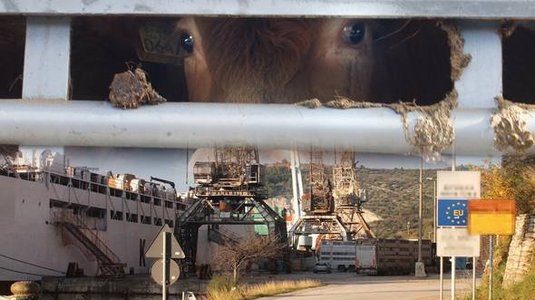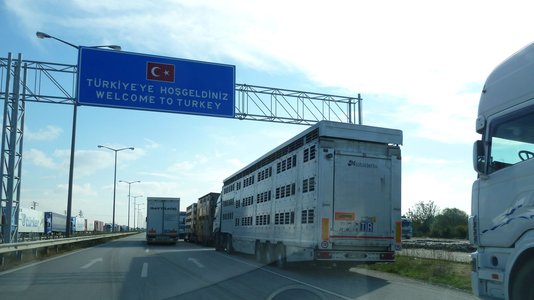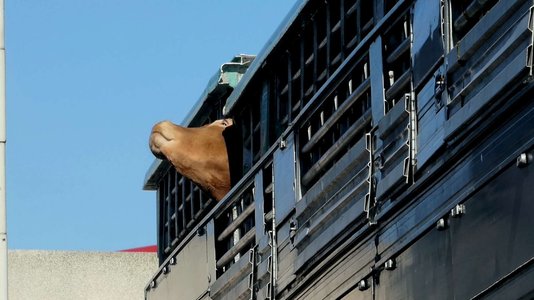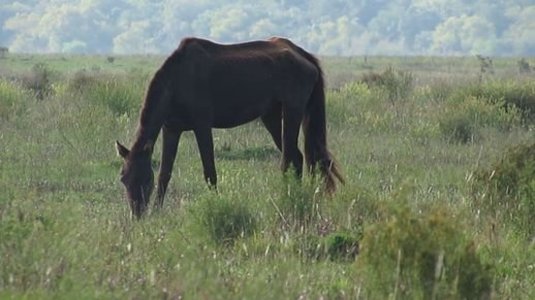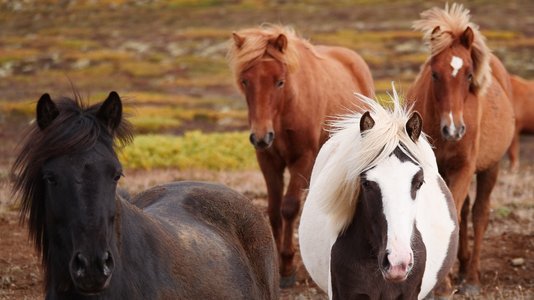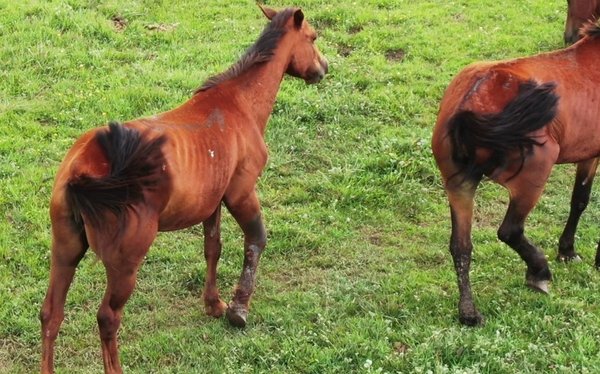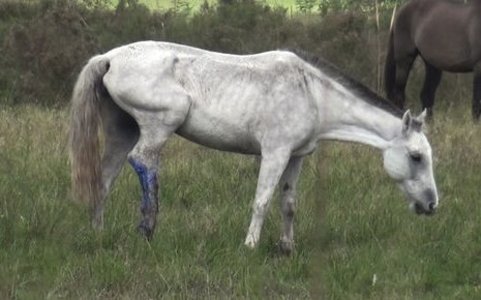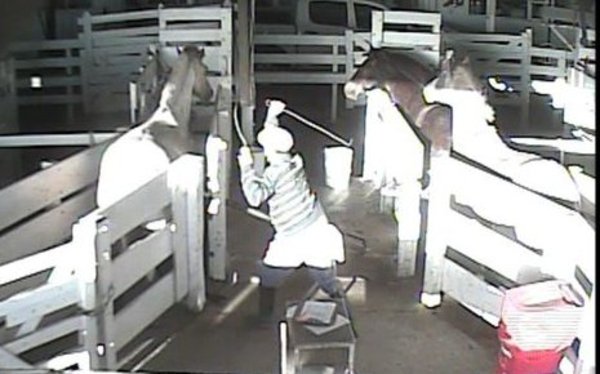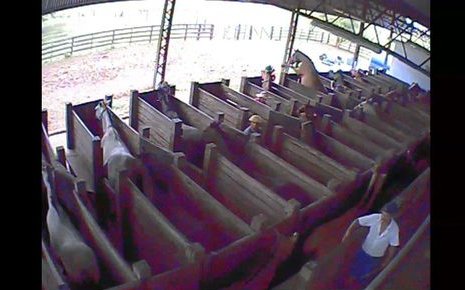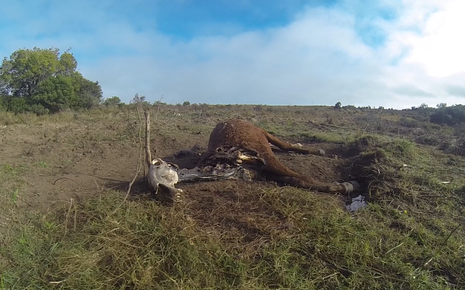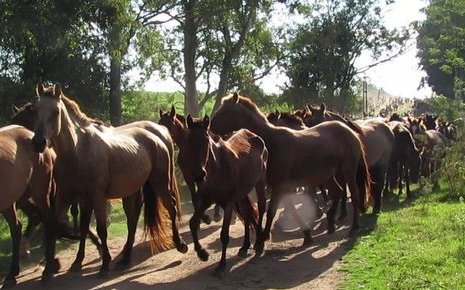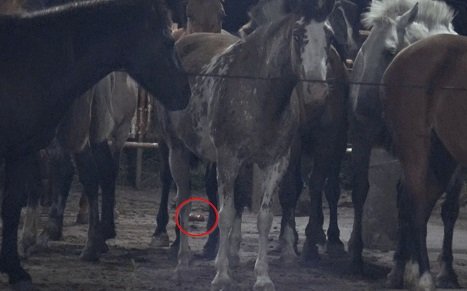Dossiers
Production of PMSG in South America
1. The blood business
For about 40 years, five companies in Uruguay and Argentina have been operating so-called blood farms. On these farms, blood is taken from pregnant mares for the production of the hormone Pregnant Mare Serum Gonadotropin (PMSG). More than 10,000 mares are exploited in Uruguay and Argentina for PMSG production. The hormone is exported worldwide, also to the European Union. Buyers are pharmaceutical companies, that sell the hormone to animal breeding farms. PMSG is used in industrial farming and serves for the induction and synchronisation of oestrus, in particular in pigs but also in sheep, cattle and goats. In Switzerland, the use of PMSG was voluntarily banned in September 2022 by the farmers’ association, which proves that animal breeding without PMSG is possible.
According to a marketing brochure for the product Fertipig, a product containing PMSG which is produced by the pharmaceutical company Ceva Santé Animale, “the breeding target should be minimum 95 % of sows in heat within 5 days and inseminated in 7 days after weaning.” The brochure further recommends treating all sows at the day of weaning in a preventive way.
Animal Welfare Foundation and Tierschutzbund Zürich have investigated about blood farms since early 2015. The more the investigation went into depth, the more it became clear that the production of the blood serum is incredibly brutal for the mares. At the time of our first investigation, the production took place without any controls by the governments of the producing countries. Today the governments claim that controls are in place. However, our on-going investigations show that the situation has not improved.
The European Commission and WOAH (formerly OIE) do not feel responsible for the control and regulation of PMSG production. In 2015, we spoke to government representatives in Uruguay, and they assumed that the European pharmaceutical companies have their PMSG produced in Argentina and Uruguay because their own animal protection laws would not allow it.
It is a business worth millions and lucrative for countries like Uruguay and Argentina. The South American governments do not intervene, and Uruguay even subsidised at least one blood farm.
The investigations of Animal Welfare Foundation and Tierschutzbund Zürich are aimed at informing and achieving an EU-wide import ban on PMSG as well as a prohibition of the use of PMSG in European animal farming.
2. The hormone PMSG
Pregnant Mare Serum Gonadotropin (PMSG) is a pregnancy hormone found in the blood of mares. It is produced in the chorion (foetal membrane) during early gestation, approx. from day 40 to 140. PMSG does not appear in the urine of mares. Because of its close relationship with the human pregnancy hormone hCG (human chorionic gonadotropin), the hormone is also called equine chorionic gonadotropin (eCG).
Use and effects
PMSG is used for the induction and synchronisation of oestrus in farmed animals, in particular pigs. Through the administration of PMSG it is intended that the sows come into heat and can be artificially inseminated at the same time, and the births take place on the same day. Thus, working processes for piglet producers become more efficient. Ceva’s marketing brochure defines the goals of PMSG use as follows: “higher insemination rate, higher piglet index, less non-productive days and better concentration of work.” Other animal species also treated with PMSG include sheep, goats and cattle.
Described (side-)effects of PMSG with pigs are, among others, superovulation due to the formation of an exceptionally large number of follicles. The superovulation leads to more piglets per litter. Often, the sows have more piglets than teats and cannot feed them all. The greater the number of piglets, the higher the risk of animals being born weak and malnourished. The “surplus” piglets are often left to die; cases have become known where they were struck dead. In some establishments the surplus piglets are fed by so-called foster sows. Furthermore, the administration of PMSG induces and accelerates the development of puberty in sows. Nowadays, the induction of puberty has no legitimacy anymore, as according to scientific studies the lifetime production and lifespan of a sow increase the better she is sexually developed when she gives birth for the first time, if i.e. the ovaries are fully developed.
Alternatives to PMSG
There are numerous alternatives available to breeders for the induction and synchronisation of oestrus in farmed animals, and their efficacy is very similar to PMSG according to studies and practical experience. In Germany, there are 36 synthetic hormones available on the market for different animal species and indications. Eight products are available for use in pigs, for example Peforelin. Scientific studies have shown that this substance is equally suited like PMSG to stimulate and synchronise oestrus in young and old sows and that its use achieves comparably good fertility performance. Contrary to PMSG, Peforelin does not lead to superovulation (larger litter sizes) nor to induction of puberty.
It is important to note that synchronisation of cycles is also possible with hormone-free methods, so-called zootechnical measures. Such methods include optimal nutrition and lighting, contact with sows in oestrus and boar contact. They are, for instance, used in organic farming, where the systematic use of fertility hormones is prohibited.
3. Producers: Blood farms in Argentina and Uruguay
The blood business is in the hands of a few companies. Besides the Argentinian company Syntex S.A., which is one of the largest producers of PMSG worldwide and has a branch in Uruguay, there are two more producers in Uruguay: the blood farms "Biomega S.A." and "La Paloma".
- Syntex S.A. (Argentina, Uruguay)
The company Syntex S.A. with its headquarters in Buenos Aires exports their products for human and veterinary medicine in over 25 countries on five continents. They operate a blood farm in the province of Buenos Aires near the city of Ayacucho. They also run a blood farm in Uruguay, the Estancia "Loma Azul" in the province of Florida. Data obtained from the Uruguayan customs shows just how profitable this business is. In 2021, the company Syntex Uruguay S.A. exported 770 grams of PMSG to the EU with a total value of 9 million US dollars. France is the destination for further distribution in the EU. 100 grams of PMSG are currently worth about 1.4 million US dollars. PMSG is one of the most expensive powders there is.
- Estancia “La Paloma” (Uruguay)
"La Paloma" is located in the province of San José. The owner of the blood farm is Roberto Mailhos, a world-famous breeder of Criollo horses.
- Biomega S.A. (Uruguay)
The blood farm "Biomega S.A." is located in the province of Cerro Largo. The owner is the veterinarian Martin Bocking who also breeds race horses. Biomega has repeatedly received subsidies from the state and Mercosur.
- Estancia “Las Marquesas” (Uruguay)
The Las Marquesas blood farm was closed down in 2018. It was owned by veterinarian and university professor Fernando Perdigon. His licence was rescinded by the Ministry of Agriculture because of our repeated reports about animal abuse.
4. Extracts from our investigations
Since March 2015, Animal Welfare Foundation and Tierschutzbund Zürich have regularly carried out investigations in Argentina and Uruguay to uncover and document the suffering of mares used for PMSG production.
The investigators have spoken to (former) employees, neighbours, blood farmers, veterinarians and representatives of the ministry in Uruguay, and documented the condition of the mares in the pastures. The findings of the investigations prove that mares are brutally abused, exploited and neglected as part of the production of PMSG. Once or twice a week, up to ten litres of blood are taken from the mares for a period of eleven to twelve weeks. The foals are systematically aborted, as the hormone can only be obtained during early pregnancy. Foals are an unwanted by-product and by aborting the foetuses, the mares can be impregnated twice a year instead of only once.
Footage of investigations carried out in 2015 showed emaciated mares, weakened by the high blood loss and permanent gestation. Mares that were covered in scars from beatings. Supervision and medical care of the animals could be observed on none of the blood farms. Video footage of a blood extraction session showed how mares were forced into the restraint boxes with brutality and abuse. About 30 minutes of the recorded five hours of footage were scenes of pure violence. The animals were hit with sticks, wooden boards, and whips. Electric prods were used as well. An employee was observed kicking a weakened mare until she collapsed and remained on the floor.
Investigations from May 2016 until April 2017 showed that despite the promises of authorities and pharmaceutical companies, the situation had not improved. Mares were still violently thrashed to be moved into the blood extraction boxes, they were still left to fend for themselves in fields and forests, injuries remained untreated and foals were still systematically aborted. Our team visited again all blood farms in Uruguay known since 2015. Based on our comprehensive investigations, we assume that about 30% of mares drop out of the production every year: they either die on the pastures or are sent to EU-approved slaughterhouses when they no longer become pregnant.
Video footage obtained in Argentina and Uruguay in January and April 2018 clearly showed that 2.5 years after the first publication about PMSG production was released, the abuse of mares producing the valuable hormone still continued. Despite the allegations of the import companies to have taken control of the situation with trainings, audits and new manuals (which are not legally binding). And despite the new manual of good animal welfare practices for PMSG production introduced by the Uruguayan ministry in June 2017. The videos showed mares being abused with iron hooks or cruelly mistreated by having their genitals stabbed with sticks. Injured, sick or emaciated mares still did not receive veterinary treatment but were left to their own devices on vast forest pastures.
New video footage obtained in Argentina and Uruguay between March 2021 and March 2022 shows that the conditions at the blood farms remain unchanged. No improvement is seen regarding the welfare concerns previously detected: Severely lame mares are not separated from the group but undergo blood extraction, emaciated horses with poor body condition are left unattended, horses with severe open wounds receive no veterinary care, horses die in the pastures without euthanasia provided. The horses have neither fresh water nor sufficient man-made or natural shelters. The handling of the mares remains unprofessional, leather whips are used to move the herds into the blood extraction building. There is no supply of special feed after blood collection. Abortions are still the standard, as we have hardly seen any foals in the herds. The new footage clearly proves that the blood farmers are not interested in animal welfare, transparency or controllability, but simply in maintaining their “big business” as profitable as possible.
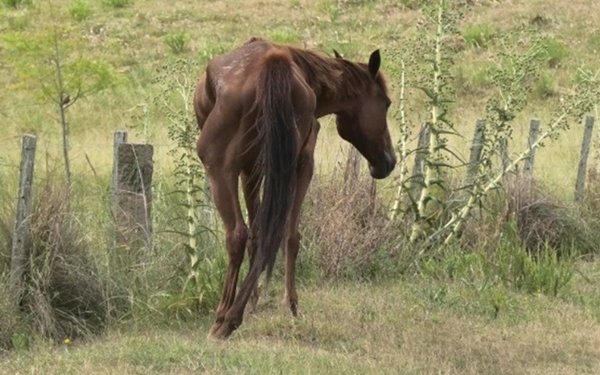
5. The legal situation of PMSG production
The production of PMSG takes place in a legal grey area: Officially, the Ministry of Livestock, Agriculture and Fisheries in Uruguay and the SENASA (Servicio Nacional de Sanidad y Calidad Agroalimentaria) in Argentina are responsible for the supervision of PMSG production. However, Argentina still has no specific legal requirements for PMSG production and thus legal foundations for controls are still missing. The Uruguayan ministry published an animal welfare manual for PMSG production in June 2017. However, it contains mainly non-binding recommendations instead of mandatory requirements and has considerable loopholes. For example, it is not defined how much and how often blood can be taken from the mares or how abortions have to be carried out. Foals still can be aborted until day 105 of pregnancy, which corresponds to the existing practice.
It is obvious that this new manual is insufficient to protect blood mares. The newest footage from Uruguay shows that not even the insufficient provisions of the manual are complied with or enforced.
The European Commission only sets animal welfare standards for meat production in non-EU countries but not for the production of active substances obtained from animals, including blood serum. The buyers of PMSG, among them European pharmaceutical companies, have so far not expressed interest in the introduction of binding laws. After all, they also profit from this legal loophole: The production of PMSG would be far less profitable without abortions and with restrictions on the volume and frequency of blood extractions.
6. PMSG-containing products and manufacturers
Products:
- Fertipig
Manufacturer: Ceva Santé Animale (France)
Use: For weaning sows - induction and synchronisation of oestrus within 7 days following the treatment; reduction of the weaning-to-oestrus interval; treatment of seasonal anoestrus
Origin of PMSG: Iceland
- Intergonan
Manufacturer: Intervet/MSD Animal Health (Germany)
Use: Intergonan is used in cattle, pigs, sheep, rabbits and minks to eliminate fertility problems and increase fertility.
Origin of PMSG: Iceland
- Fixplan
Manufacturer: Syntex S.A. (Argentina) - owner of the Syntex blood farms in Argentina and Uruguay
Distributors: Syn Vet-Pharma Ireland Limited / Serumwerk Bernburg
Use: Induction of oestrus in cattle, sheep and sows; induction of superovulation; increase in fertility rates; treatment of anoestrus
Origin of PMSG: South America
- Folligon
Manufacturer: Intervet/MSD Animal Health (Germany)
Use: Induction and synchronisation of ovulation in cattle, pigs and sheep; induction of superovulation in cattle; increase of fertility rate
Origin of PMSG: Iceland
- Gestavet
Manufacturer: Laboratorios Hipra (Spain)
Use: Induction and synchronisation of oestrus in pigs
Origin of PMSG: South America
- Novormon
Manufacturer: Syntex S.A. (Argentina)
Distributor: Zoetis
Use: Induction of ovulation and superovulation of cattle, sheep and pigs; oestrus synchronisation in sheep, goats and sows; preparation for artificial insemination and embryo transplantation
Origin of PMSG: South America
- P.G. 600
Manufacturer: Intervet/MSD Animal Health (Germany)
Use: Induction of oestrus after weaning of piglets, also after longer anoestrus; larger litter sizes; induction and synchronisation of oestrus in prepubertal gilts
Origin of PMSG: Iceland
- Pregmagon
Manufacturer: Ceva Tiergesundheit GmbH (Germany)
Use: Induction and synchronisation of oestrus in pigs and sheep; induction of superovulation in cattle and sheep; induction of puberty in gilts
Origin of PMSG: Iceland
- Suigonan
Manufacturer: Intervet/MSD Animal Health (Germany)
Use: Induction of oestrus after weaning of piglets, also after longer anoestrus; larger litter sizes; induction and synchronisation of oestrus in prepubertal gilts
Origin of PMSG: Iceland
- Syncrostim
Manufacturer: Ceva Santé Animale (France)
Use: Induction and synchronisation of oestrus and ovulation in cattle and sheep
Origin of PMSG: Iceland
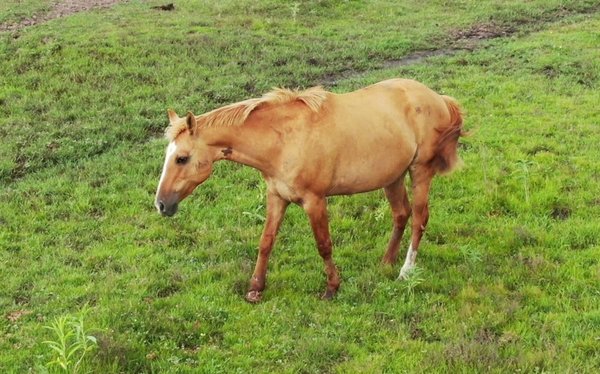
- Sergon
Manufacturer: Bioveta (Czech Republic)
Use: Anoestrus, induction and synchronisation of heat in cattle, pigs, sheep, goats, dogs, rabbits
Origin of PMSG: unkown
Manufacturers of products containing PMSG:
MSD Animal Health (Merck)/Intervet
Merck is the third largest global animal health company. After years of investigative work by AWF|TSB, and hundreds of thousands of SumOfUs members taking action, pharma giant MSD/Merck completely ceased the trade with blood farms in South America at the beginning of 2017 and now purchases PMSG from Iceland.
Success announcement of SumOfUs from July 2017: https://actions.sumofus.org/a/merck-horse-blood
IDT Biologika GmbH, Dessau-Rosslau, Germany
In July 2018, the pharma company IDT Biologika announced to stop the import of PMSG from blood farms in South America.
Success announcement of SumOfUs from July 2018: https://www.sumofus.org/media/consumer-group-applauds-germanys-idt-biologika-for-cutting-ties-with-torturous-horse-blood-farms-in-south-america/
In 2019, the animal health division of IDT Biologika was purchased by the French company Ceva Santé Animale.
Ceva Santé Animale, Libourne, France
Ceva Santé Animale was founded in France in 1999. It employs more than 3,800 people in 44 countries. Its headquarters are in Libourne (Gironde). Ceva’s focus areas in the field of farm animals are reproduction and injectable antibiotics.
Until August 2018, Ceva purchased PMSG from the company Syntex in Argentina. After repeated media reports about the mistreatment of mares in the Syntex blood farm, Ceva announced in August 2018 to stop sourcing PMSG from South America.
http://www.cevavousrepond.com/
http://fs-1.5mpublishing.com/images/ceva/brochure_fertipig_vcorp_low.pdf
In 2019, Ceva acquired the veterinary business of the German company IDT Biologika and took over IDT’s contracts with European PMSG suppliers, including the company ISTEKA in Iceland.
Laboratorios Hipra, Amer (Girona), Spain
Laboratorios HIPRA SA, a family company with a 60-year history, has its headquarters in Spain and currently has 27 branch offices worldwide, two production sites (Spain & Brazil) and three research sites (Spain, USA & Brazil). HIPRA is exclusively specialized in products for farm animals.
According to a confidential, reliable source, Laboratorios HIPRA SA imports PMSG from South America (Uruguay). So far, the company has refused all dialogue with AWF|TSB and journalists.
Zoetis is the largest global animal health company. The company was a subsidiary of Pfizer, the world's largest drug maker, but it is now a completely independent company. It was founded in 1952 and has its headquarters in New Jersey, USA. Twenty-eight sites in eleven countries make up Zoetis’ manufacturing network: https://en.wikipedia.org/wiki/Zoetis
Zoetis purchases PMSG from the blood farm Syntex SA in Argentina. In 2015, Zoetis signed an asset purchase and manufacturing agreement with Syntex. In South America, Zoetis sells Syntex’ own brand Novormon, while the import of PMSG to Europe was stopped in 2016.
